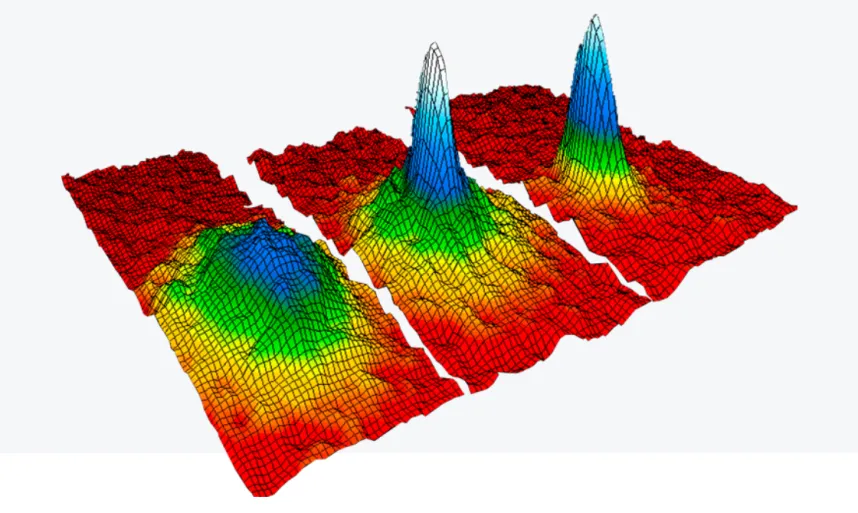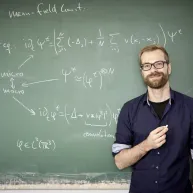Mathematical Physics
The focus of my research is on non-equilibrium quantum systems, using mathematical tools from the fields of analysis and partial differential equations. There are two types of systems that need to be differentiated:
- Fermi gases: Fermions are one of the two fundamental types of particles in nature. They have a tendency to repel each other.
- Bose gases: Bosons are the other type of fundamental particle, and tend to cluster, which leads to the effect of Bose-Einstein condensation.
From the perspective of a microscopic derivation of effective dynamics, there is still much to explore for these types of systems. The high relevance for modern-day experiments makes this area of research particularly compelling. For example, Bose-Einstein condensates are now regularly created in laboratories, after their first experimental realization in 1995. This research also promotes a fundamental understanding of the transition between micro and macro phenomena.
For both Bose and Fermi gases, we consider systems where the particles are so close together that we can effectively describe the whole cloud of particles collectively. Some of the results obtained for such systems are:
- Asymptotic Expansions for Bose Gases — For mean-field Bose gases, most of the particles are condensed and they occupy the same quantum state. This means they collectively show quantum behavior, and can be described by a nonlinear Schrödinger equation. But often this condensate is very homogeneous, so we are more interested in the deviations from the condensate. Such deviations form quasiparticles, which are objects that are collective excitations of many particles, but can also effectively be described as a separate particle. In a series of recent works, we have shown exactly how the quasi-particles interact. This is described with a so-called asymptotic expansion. We have applied these ideas to particles with pair interaction, and to particles interacting with a radiation field. In terms of applications, we have computed binding energies and corrections to a central limit theorem. This was joint work with collaborators from IST Austria, LMU Munich in Germany, Politecnico di Milano in Italy, Rutgers University in the United States, and University of Basel in Switzerland.
- Fermi Gases — In this area, we have been trying to prove the Hartree-Fock equations in a meanfield limit. This corresponds to the idea that each electron has its own “orbital”. We have obtained results for bounded interactions, but how to do this for Coulomb interaction remains an open question. We will investigate this within a joint French-German collaboration project together with researchers in Braunschweig, Lorraine, and Rennes.
Currently, the research group consists of several Bachelor students. Two postdocs are expected to join the group soon. We are about to start two DFG-funded projects on “Effective Approximation and Dynamics of Many-Body Quantum Systems” and “Asymptotic Expansions for the Weakly Interacting Bose Gas”.
- L. Boßmann, S. Petrat, P. Pickl, and A. Soffer. Beyond Bogoliubov Dynamics. Pure Appl. Anal., 3(4): 677-726 (2021).
- L. Boßmann, S. Petrat, and R. Seiringer. Asymptotic Expansion of Low-energy Excitations for Weakly Interacting Bosons. Forum Math. Sigma, 9, e28 (2021).
- M. Lienert, S. Petrat, and R. Tumulka. Multi-Time Wave Functions — An Introduction. SpringerBriefs in Physics, Springer Nature Switzerland (2020).
- S. Petrat, P. Pickl, and A. Soffer. Derivation of the Bogoliubov Time Evolution for a Large Volume Mean-field Limit. Ann. Henri Poincaré, 21(2): 461-498 (2020).
- D. Mitrouskas, S. Petrat, and P. Pickl. Bogoliubov Corrections and Trace Norm Convergence for the Hartree Dynamics. Rev. Math. Phys., 31(8): 1950024 (2019).

